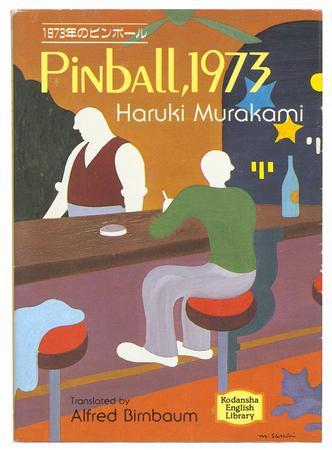September 30th, 2010
Pinball Wizard

When I started reading Haruki Murakami’s work, the going rate on eBay for Kodansha’s English translation of Pinball 1973 was well over $250 a copy. I couldn’t and still can’t afford to pay that much for a novel (and wouldn’t if I could), and until recently, the only version I had of Alfred Birnbaum’s translation was one that had been transcribed onto a Microsoft Word document. I figured until a US/UK publisher got the rights, I’d be stuck with my digital copy. Well, never fear — it looks like the English translation of Pinball 1973 finally came back into print in Japan because I just bought it for $15 from an eBay seller.
In any event, both Pinball 1973 and its predecessor, Hear the Wind Sing, provide interesting, if entirely non-compulsory backstory to the events of Murakami’s more internationally known work, Wild Sheep Chase — in fact, the three books form what Murakami calls, “The Trilogy of the Rat.” J’s Bar, the novel’s unnamed narrator, his business partner, and the aforementioned Rat all get introduced in these two early works. Both of these slender tomes provide an interesting primer to all things Murakami: references abound to author fetishes like elephants, ears, spaghetti, suicide by hanging in a forest, an old girlfriend named Naoko, and wells — the deep, dark bottomless kind.
Published in 1980 as 1973-nen no pinbōru and translated into English in 1985, Pinball 1973 possesses an even more meandering narrative than Murakami’s slim debut novel, Hear the Wind Sing. If there’s a plot (and I’m not entirely convinced that there is), it boils down to this: a story of one man’s search for an old, possibly magical pinball machine. But despite its title and the unnamed narrator’s insistence that “This is a novel about pinball,” Pinball 1973 doesn’t really center on the titular machine until more than halfway through the story. It’s not until then that the novel actually coalesces into — well, just that — a novel. Earlier segments of the book are more or less a loose patchwork of narrative fragments, random reminisces, and occasionally clever asides.
I admit that I did like the part where our protagonist woke up in bed with two beautiful twin sisters, who then proceeded to move into his apartment, act all cute and cheery, and presumably engage in activities off-text that would make a great letter to Penthouse. Sounds a lot like the saucy premise of an anime that’s big on “fan service,” doesn’t it? Who knew Murakami was the original otaku?
Ultimately, Pinball 1973 reads like a jazz riff on Hear the Wind Sing. If Murakami ever allows the two novels to be released in the West, he’d do well to instruct the publisher to collate the two works as a single book. It’d make for more substantial reading.
Unlike Hear the Wind Sing, Pinball 1973 was never turned into a film — probably due to how bad that adaptation turned out to be in Murakami’s eyes. So in lieu of a trailer, I give you…The Who! Enjoy.
It’s sad to think that a whole generation of kids will know them only though CSI and its spin-offs.

